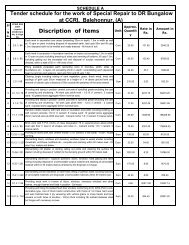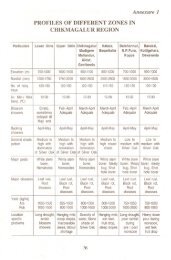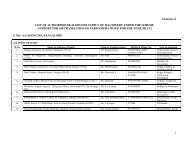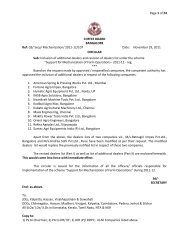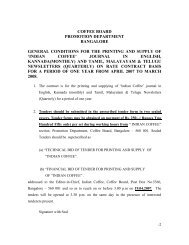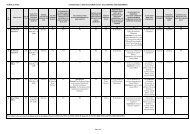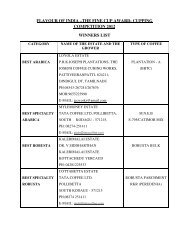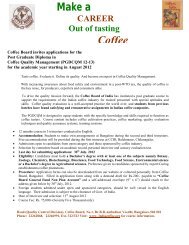COFFEE CULTIVATION GUIDE - Coffee Board of India
COFFEE CULTIVATION GUIDE - Coffee Board of India
COFFEE CULTIVATION GUIDE - Coffee Board of India
Create successful ePaper yourself
Turn your PDF publications into a flip-book with our unique Google optimized e-Paper software.
e used for harvesting c<strong>of</strong>fee fruits. No fruits should be allowed to remain in the<br />
plants after the end <strong>of</strong> season harvest as it can invite berry borer infestation.<br />
4. <strong>C<strong>of</strong>fee</strong> Processing<br />
32<br />
(a): Preparation <strong>of</strong> Parchment c<strong>of</strong>fee<br />
Parchment c<strong>of</strong>fee or plantation c<strong>of</strong>fee can be prepared by pulping, cleanly<br />
washed with water and dried under sun. Preparation <strong>of</strong> such c<strong>of</strong>fee requires pulping<br />
equipments and adequate supply <strong>of</strong> clean water. The quality <strong>of</strong> parchment c<strong>of</strong>fee is<br />
always superior to that <strong>of</strong> cherry c<strong>of</strong>fee (whole fruit dried under sun). Cherry c<strong>of</strong>fees<br />
always give fruity taste as the beans are in contact with the mucilage for a longer time<br />
during the course <strong>of</strong> drying period. Therefore, wet processing <strong>of</strong> c<strong>of</strong>fee is essential to<br />
get superior quality c<strong>of</strong>fee and the method can be followed wherever, all the adequate<br />
facilities like sufficient clean water and good processing machineries are available.<br />
The pulper, pulper tanks, siphon tanks, rakers, washer, fermentation tanks<br />
should be thoroughly cleaned before the pulping operation is undertaken. The<br />
premises <strong>of</strong> the pulper unit as well as the drying yards should be kept in hygienic way.<br />
The pulper unit should be properly adjusted depending on the fruit size and checked<br />
every day to prevent cuts. Pulper nipped and other deformed beans will yield<br />
defective low quality parchment.<br />
The pulping and washing machineries and other equipments used in the preparation <strong>of</strong><br />
parchment c<strong>of</strong>fee should be cleaned on daily basis. No fruits, fruit skins or beans from<br />
the previous day’s harvest should be allowed to remain and mix with fresh c<strong>of</strong>fee<br />
fruits or pulped beans. These materials badly damage the parchment c<strong>of</strong>fee quality.<br />
Only clean water shall be used for processing c<strong>of</strong>fee fruits and all the extraneous<br />
matters such as leaves, twigs and stones should be thoroughly removed from the fruits<br />
before pulping. If adequate supply <strong>of</strong> water is not available, then the water used for<br />
pulping the fruits can be recycled to pulp the fruits second time. The pulped water<br />
however, should not be used on the second day. Further, pulped water should never be<br />
used for washing the c<strong>of</strong>fee beans under any circumstances.<br />
As far as possible, harvested fruits have to be pulped on the same day <strong>of</strong> the harvest.<br />
If, it is not possible to process all the fruits on the same day, such fruits can be stored<br />
under clean water and pulped on the second day. The fruits stored for more than 10<br />
hours in the open heap without pulping will result in fruity cup. The fruit skins<br />
separated by pulping should be taken away from the pulping site as quickly as<br />
possible so that microbial decomposition <strong>of</strong> the skin does not affect the quality <strong>of</strong><br />
parchment c<strong>of</strong>fee.<br />
The sticky mucilage on the pulped beans can be removed by 4 different<br />
methods. However, the commonly followed/adopted methods are two namely: (1)<br />
Natural Fermentation and (ii) : Aqua machine wash by friction.<br />
Superior quality c<strong>of</strong>fee can be obtained by natural fermentation method. Fermentation<br />
is a critical stage in processing and has a deep influence on the quality <strong>of</strong> c<strong>of</strong>fee.<br />
When pulped c<strong>of</strong>fee is stored in fermentation tanks along with the mucilage, natural<br />
hydrolysis <strong>of</strong> pectins present in c<strong>of</strong>fee mucilage occurs due to the enzymes naturally<br />
present in c<strong>of</strong>fee mucilage. In Arabica c<strong>of</strong>fee, natural fermentation will be complete<br />
in about 24 to 36 hours. However, this may take longer time also when the ambient<br />
temperature is too low. The fermentation process should be controlled so that over<br />
32



